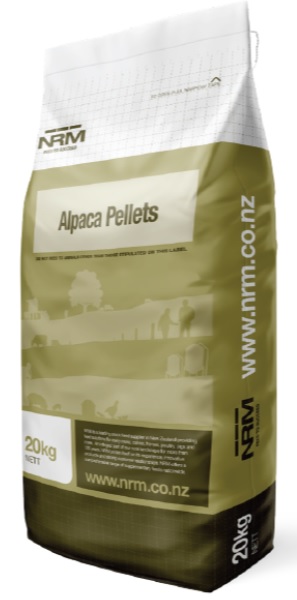Expert knowledge. Expert opinion.Expert formulas.


Alpaca Pellets
High energy pellets formulated from non-GMO* ingredients designed specifically for alpacas and llamas
High specification pellets designed specifically enriched with essential vitamins to supplement pasture for alpacas and llamas that need to gain additional condition. This includes lactating animals, cria and poor performers that need supplementary feeding.
Key Benefits and Features
- Non-GM grains, legumes, molasses and broll to deliver a high level of energy to help gain body condition.
- Contains a wide range of major minerals and trace elements to help support health and vigour.
- Added protein to help balance low protein forages like hay and mature grazing.
- Added vitamin B1 to help prevent thiamine deficiency and elevated levels of the sunshine vitamin – Vitamin D3.
- A convenient pellet for increased utilisation, durability and reduced wastage.

Feeding Recommendation
NRM Alpaca Pellets can be fed at times of low pasture quality to fill a feed gap or when extra condition is required. Excess feeding should be avoided to prevent animals becoming over weight. Transition onto NRM Alpaca Pellets by starting with 50g/head/day for a week, before building up to the desired daily feeding rate over the next one to two weeks. Ensure an adequate amount of forage and clean drinking water is available at all times.
Ingredients selected from
Wheat, maize grain, barley, grain by-products, grass fibre, peas, beans, canola meal, molasses, limestone flour, dicalcium phosphate, magnesium oxide, salt, New Zealand vegetable oil, trace mineral and vitamin premix delivering 1mg/kg selenium and 20mg/kg copper, flavour, preservative.
NRM Alpaca Pellet formulations do not contain soya bean meal, soya hulls, corn gluten meal, maize DDGS, tapioca, copra meal or Palm Kernel Expeller.
Storage
Please ensure product is stored in a cool, dry and vermin free environment.
Caution: Do not feed to sheep.
Feeding Rates
Crias | up to 0.5kg/head/day (depending on age and body weight). |
| Pregnant alpacas (last trimester) | 0.15 to 0.25kg/head/day |
| Lactating alpacas | 0.15 to 0.5kg/head/day (up to 1kg/head/day for short period if required). |
| Wethers, nonpregnant females and early pregnancy | up to 0.15kg/head/day provided they do not become overweight. |
Typical analysis (approximate on a dry matter basis)
| Energy | 12.5MJ ME/kg DM |
| Protein | 15% |

